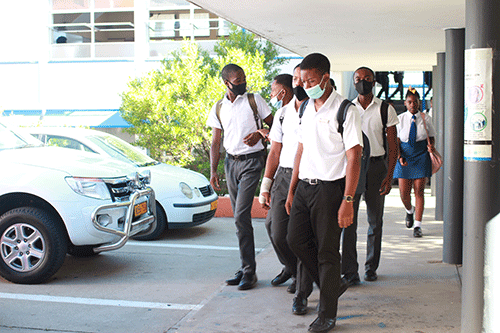Learners have scored an unexpected long weekend as 100 000 civil servants, including teachers, will cast their votes in favour or against the looming national strike.
Education minister Anna Nghipondoka has granted permission for deviation from the approved school calendar to allow teachers and staff to participate.
Following an unresolved dispute on the salary and other benefits for the financial years 2021/2022 and 2022/2023, salary negotiations between the government negotiating team (GNT) and the two bargaining unions, the Namibia National Teachers’ Union (Nantu) and Namibia Public Workers Union (Napwu), preparations for this balloting process are underway.
The parties also looked at practical logistics to have a credible, transparent balloting process, and the dates 28 and 29 July 2022 had been identified respectively.
According to the Education Act 2001, (Act 16 of 2001), Section 37(2): “The minister may approve a deviation from the school calendar determined under this section, either generally or for any particular school.”
Education executive director Sanet Steenkamp announced the minister granted regional directors of education to oversee the suspension of teaching and learning activities for 28 and 29 July 2022, in order to allow the balloting process for teachers and unified staff.
“Regional directors through the respective inspectors of education, school principals, heads of department, teachers and school boards should further oversee the release of teachers and unified staff members to be afforded the opportunity to cast their ballots,” she directed.
Steenkamp also said the hostel boarders must remain in their hostels and must be supervised by staff on a shift basis.
She cautioned the shifted release of the unified staff to cast their ballots must be done in a manner that safeguards the health and wellbeing of the hostel boarders.
Equally, she directed school heads to jointly craft a plan to compensate for the teaching and learning time that will be suspended on 28 and 29 to be recovered during the course of the second semester.
“The possible extension of teaching hours on future designated days could be an option to consider. Regional directors are urged to communicate and publicise this information as widely and promptly as possible to ensure the health and well-being of the learners and to enable the smooth administration and conduct of the balloting process for teachers and unified staff,” Steenkamp urged.
Meanwhile, the Students Union of Namibia (SUN) believes when parents are depressed, it lowers their natural ability to provide safety and economic challenges have a huge impact on learners’ performance.
“A hungry teacher cannot deliver; an unhealthy teacher cannot always be present at school,” SUN leader Benhard Kavau remarked yesterday.
However, the union feels there is a lack of political will from the government to address the economic challenges affecting civil servants.
Equally, the union charges there is a gap of proper leadership from both government and the various unions representing civil servants, all government top structures, including parliament, never reduced their salaries to lead by example.
“When teachers strike, the country will be at a standstill. Parents will not go to work as no one will take care of their children at home. Daycare centres will be closed, everyone will be affected. Academic performance for learners last year was worse so we should be ready to even see the worst of the worst. One way or another, one must swallow their pride before we have a collapsed state. The nation is crying for leadership and now it’s time for the government to prove it,” Kavau challenged.
Financial experts and economic analysts have warned civil servants that forcing the government to institute salary increases now could backfire in the future as elevated expenditure would ultimately increase the already inflated public service wage bill.
Workers’ unions representing the interests of civil servants requested a 10% increment across the board, a 25% increase to qualifying amounts on housing subsidies, a 9% increase on housing allowances, a 10% increase in transport for civil servants below management, and a N$7 per kilometre tariff increase.
Despite efforts by the unions to revise their initial proposals for a basic salary increase from 10% to 5%, the government still didn’t consider it.
The only partial benefit government is willing to make an offer on is the housing allowance, where management and staff members below the management cadre would get a 4.5% increase.
–anakale@nepc.com.na


